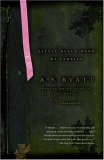Summary | Excerpt | Reviews | Readalikes | Genres & Themes | Author Bio

Critics' Opinion:
Readers' Opinion:
First Published:
Apr 2004, 240 pages
Paperback:
Feb 2005, 256 pages
Excerpt
The Little Black Book of Stories
There were once two little girls who saw, or believed they saw, a thing in a forest. The two little girls were evacuees, who had been sent away from the city by train, with a large number of other children. They all had their names attached to their coats with safety-pins, and they carried little bags or satchels, and the regulation gas-mask. They wore knitted scarves and bonnets or caps, and many had knitted gloves attached to long tapes which ran along their sleeves, inside their coats, and over their shoulders and out, so that they could leave their ten woollen fingers dangling, like a spare pair of hands, like a scarecrow. They all had bare legs and scuffed shoes and wrinkled socks. Most had wounds on their knees in varying stages of freshness and scabbiness. They were at the age when children fall often and their knees were unprotected. With their suitcases, some of which were almost too big to carry, and their other impedimenta, a doll, a toy car, a comic, they were like a disorderly dwarf regiment, stomping along the platform.
The two little girls had not met before, and made friends on the train. They shared a square of chocolate, and took alternate bites at an apple. One gave the other the inside page of her Beano. Their names were Penny and Primrose. Penny was thin and dark and taller, possibly older, than Primrose, who was plump and blonde and curly. Primrose had bitten nails, and a velvet collar to her dressy green coat. Penny had a bloodless transparent paleness, a touch of blue in her fine lips. Neither of them knew where they were going, nor how long the journey might take. They did not even know why they were going, since neither of their mothers had quite known how to explain the danger to them. How do you say to your child, I am sending you away, because enemy bombs may fall out of the sky, because the streets of the city may burn like forest fires of brick and timber, but I myself am staying here, in what I believe may be daily danger of burning, burying alive, gas, and ultimately perhaps a grey army rolling in on tanks over the suburbs, or sailing its submarines up our river, all guns blazing? So the mothers (who did not resemble each other at all) behaved alike, and explained nothing, it was easier. Their daughters they knew were little girls, who would not be able to understand or imagine.
The girls discussed on the train whether it was a sort of holiday or a sort of punishment, or a bit of both. Penny had read a book about Boy Scouts, but the children on the train did not appear to be Brownies or Wolf Cubs, only a mongrel battalion of the lost. Both little girls had the idea that these were all perhaps not very good children, possibly being sent away for that reason. They were pleased to be able to define each other as "nice." They would stick together, they agreed. Try to sit together, and things.
The train crawled sluggishly further and further away from the city and their homes. It was not a clean train—the upholstery of their carriage had the dank smell of unwashed trousers, and the gusts of hot steam rolling backwards past their windows were full of specks of flimsy ash, and sharp grit, and occasional fiery sparks that pricked face and fingers like hot needles if you opened the window. It was very noisy too, whenever it picked up a little speed. The engine gave great bellowing sighs, and the invisible wheels underneath clicked rhythmically and monotonously, tap-tap-tap-CRASH, tap-tap-tap-CRASH. The window-panes were both grimy and misted up. The train stopped frequently, and when it stopped, they used their gloves to wipe rounds, through which they peered out at flooded fields, furrowed hillsides and tiny stations whose names were carefully blacked out, whose platforms were empty of life.
The children did not know that the namelessness was meant to baffle or delude an invading army. They felt—they did not think it out, but somewhere inside them the idea sprouted—that the erasure was because of them, because they were not meant to know where they were going or, like Hansel and Gretel, to find the way back. They did not speak to each other of this anxiety, but began the kind of conversation children have about things they really disliked, things that upset, or disgusted, or frightened them. Semolina pudding with its grainy texture, mushy peas, fat on roast meat. Listening to the stairs and the window-sashes creaking in the dark or the wind. Having your head held roughly back over the basin to have your hair washed, with cold water running down inside your liberty bodice. Gangs in playgrounds. They felt the pressure of all the other alien children in all the other carriages as a potential gang. They shared another square of chocolate, and licked their fingers, and looked out at a great white goose flapping its wings beside an inky pond.
Excerpted from Little Black Book of Stories by A. S. Byatt Copyright© 2004 by A. S. Byatt. Excerpted by permission of Knopf, a division of Random House, Inc. All rights reserved. No part of this excerpt may be reproduced or reprinted without permission in writing from the publisher.





The Funeral Cryer by Wenyan Lu
Debut novelist Wenyan Lu brings us this witty yet profound story about one woman's midlife reawakening in contemporary rural China.
Your guide toexceptional books
BookBrowse seeks out and recommends the best in contemporary fiction and nonfiction—books that not only engage and entertain but also deepen our understanding of ourselves and the world around us.